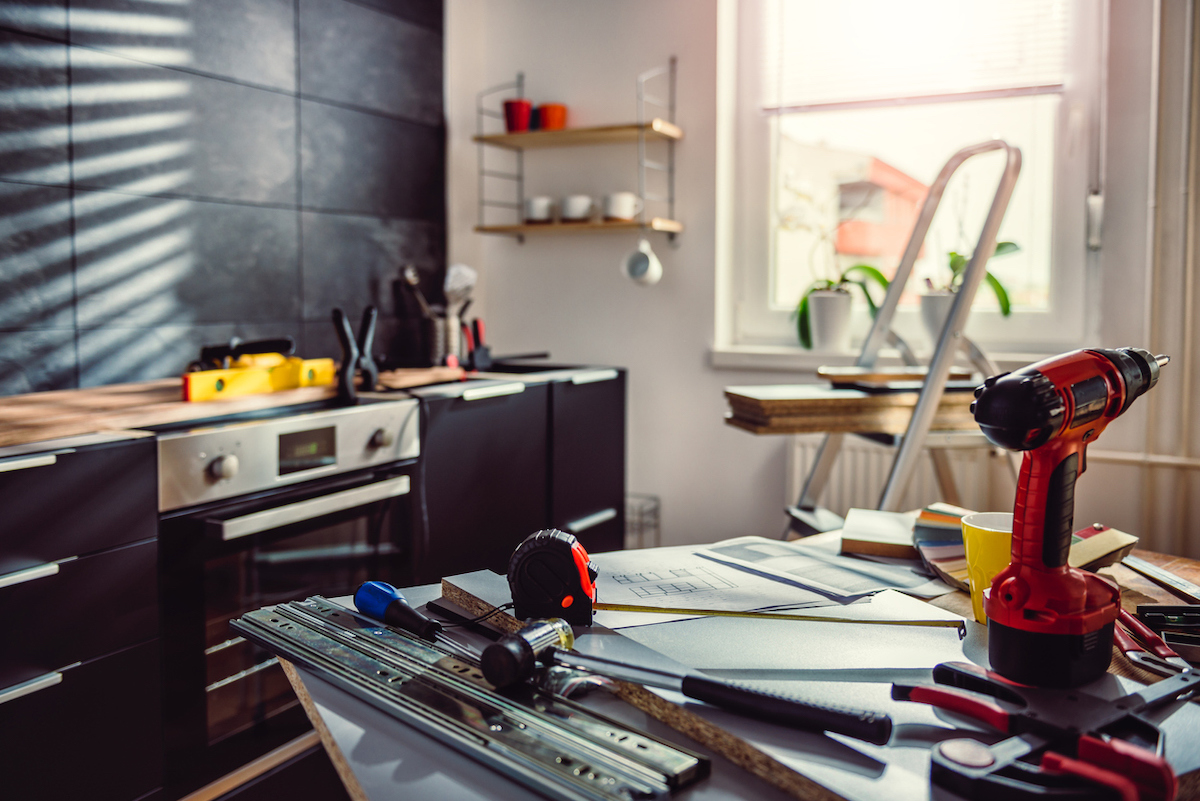We may earn revenue from the products available on this page and participate in affiliate programs. Learn More ›
Every home can use a little sprucing up. If you’ve been overwhelmed by a list of needed house projects in the past, this is your chance to tackle a few easy DIY home projects like a pro. Even if you think you’re the least handy person around, these home projects are doable.
Not only can you save money by tackling DIY projects for home, but you can learn useful skills along the way. Building these skills may boost your mental capacity, and in the process, you may discover new passions and greater confidence. DIY at home can also provide creative ways to express yourself.
1. Wallpaper a Wall
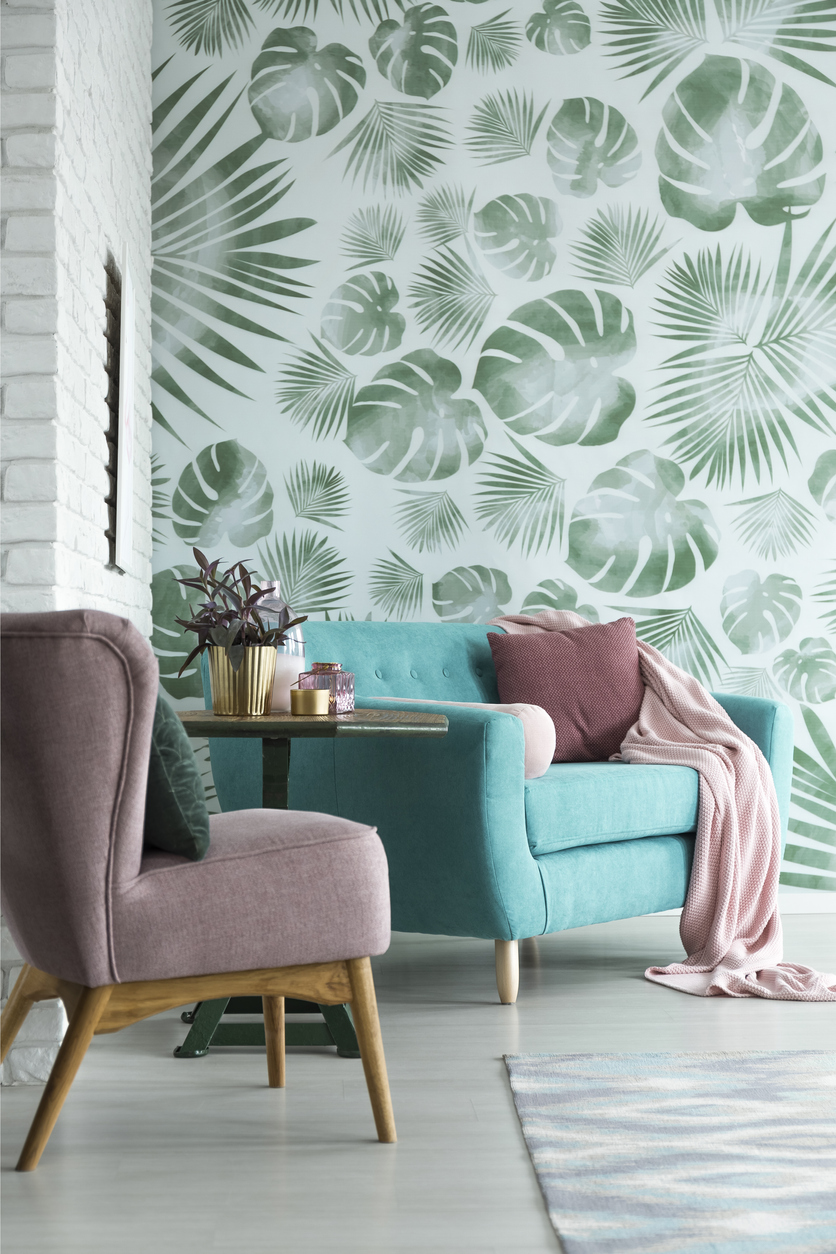
Wallpaper can add color and pattern in an elegant or invigorating way that paint can’t always match. Available in a variety of materials, it can also add texture to your room. Today’s prepasted papers make your DIY décor easier to apply. Just be sure to measure the height and width of each wall and multiply those numbers to calculate the square footage of the wall.
You can subtract 10 square feet for every door or large window. If your chosen wallpaper has a pattern, professionals recommend buying an extra roll or two in the same dye lot, depending on the size of the pattern.
2. Make Compost

Composting diverts materials from the waste stream, decreasing trash at landfills while also improving soil: a win-win. It’s a simple habit to pick up. Just be sure to learn what can be composted—such as fruits, vegetables, coffee grounds, dryer lint, shredded newspaper, grass clippings, and small leaves and twigs—and what can’t. For example, don’t add meat or dairy products to your compost.
Ideally, you’ll want three parts brown material (leaves, twigs, and the like) to one part green material (kitchen scraps and grass clippings). Place your compost in a warm sunny spot, keep it moist, and turn it frequently to aid the breakdown process.
3. Tile a Backsplash
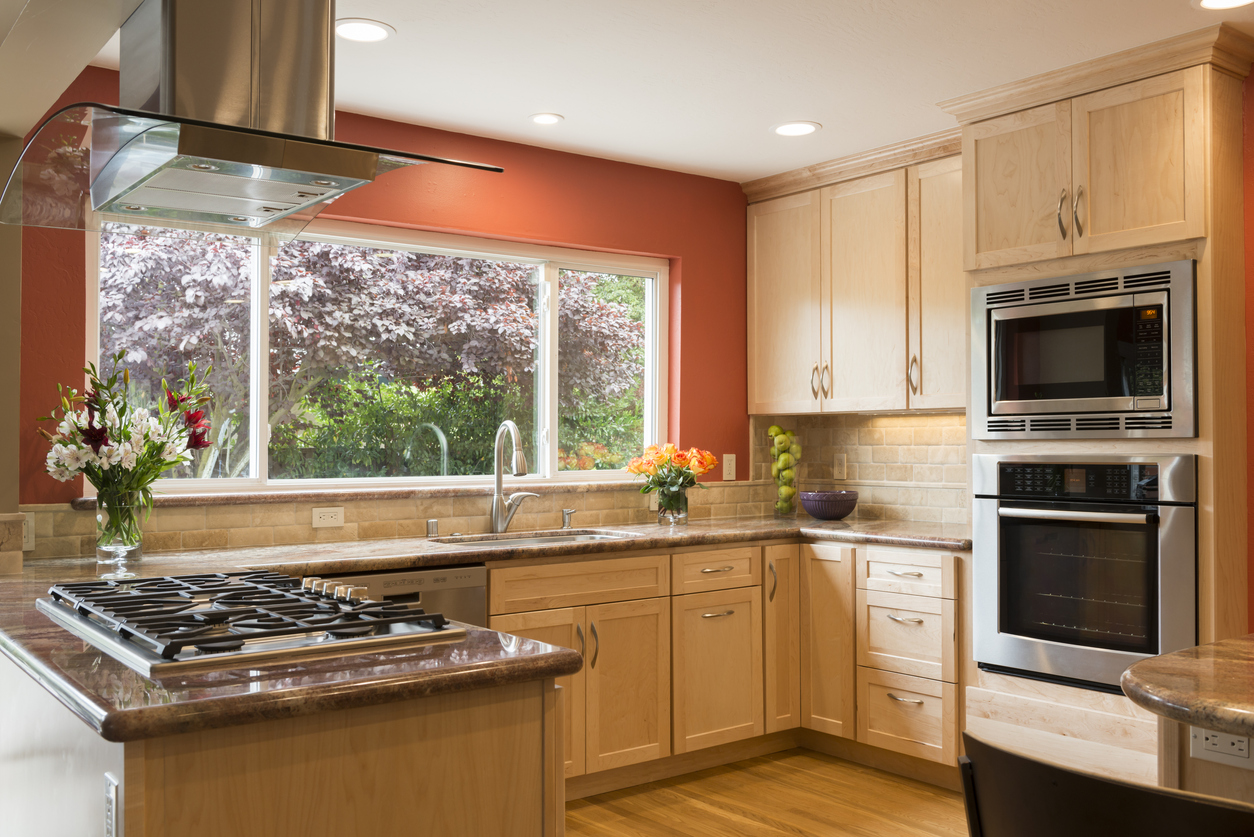
Backsplashes have a practical side—they protect your walls from food stains, after all—but they also have a decorative purpose. There’s a wealth of colors, sizes, and shapes of tiles from which to choose for a backsplash. Once you’ve selected your tiles, measure the space and mark your starting point. Apply tile mastic to adhere the bottom row to the wall. Insert spacers and keep going. You may need to score and cut tile around electrical outlets.
The next day, grout the tile using a rubber float. After the grout has set for an hour, wipe away any excess.
4. Install Vinyl Flooring
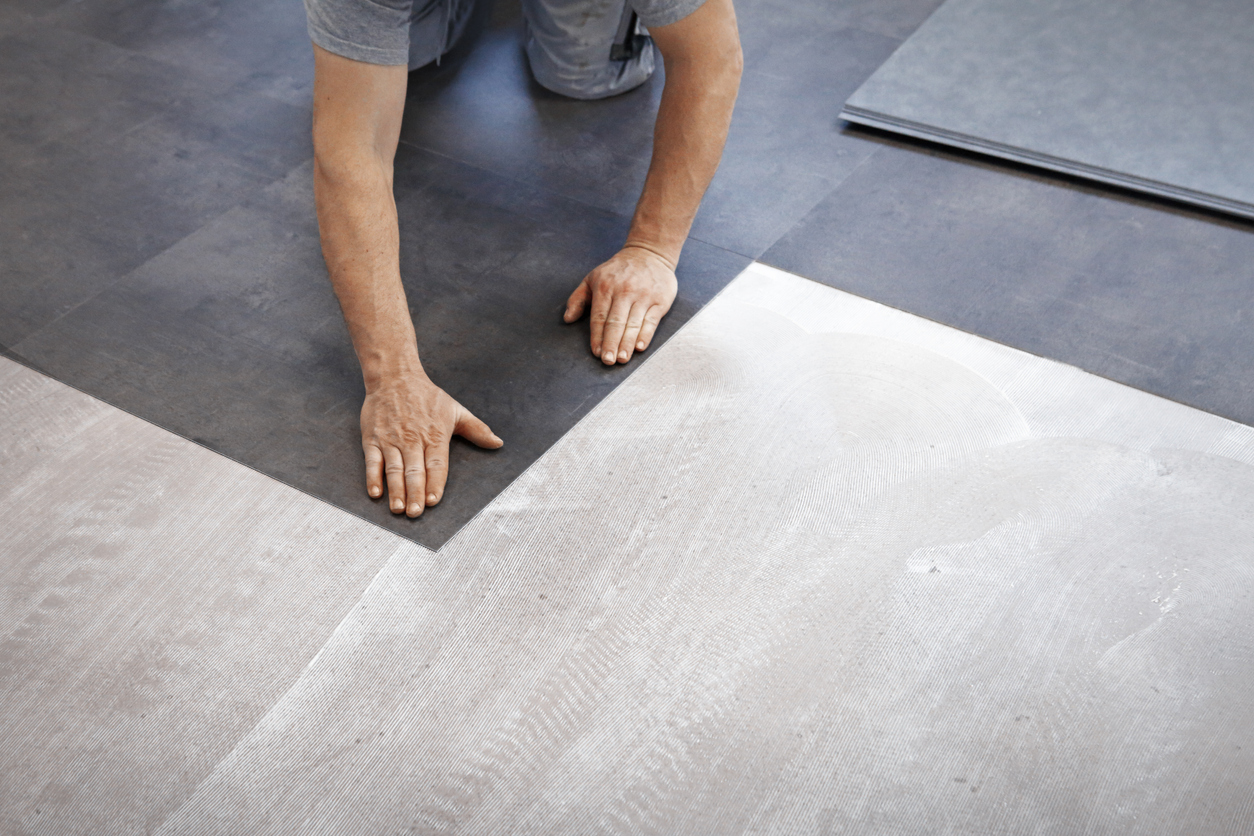
Vinyl flooring comes in many iterations: by the roll, in “tiles,” and in plank form. Any version makes a great surface, particularly in rooms where high moisture levels occur, such as kitchens and bathrooms.
Vinyl plank flooring is easy to cut, doesn’t require bonding to the subfloor, and snaps together simply for a tight fit. Gather the proper tools, remove baseboards and molding, measure accurately, make sure the floor is level, and begin laying out your floor. For floor ducts and door frames, use a utility knife to cut to fit. Tiles are laid in similar fashion. Rolls of flooring have to be carefully unrolled a few feet at a time, removing the backing as you go in order for it to adhere to the floor.
RELATED: The Best Vinyl Plank Flooring for Your Home
5. Build a Raised Garden Bed

If you’re looking for things to build with the kids, a raised garden bed may interest you. They make growing vegetables and flowers easier on your back and knees because you don’t have to bend all the way down to the ground. Choose a spot and plot out the size and footprint of your raised bed; 3 feet wide typically enables gardeners to easily reach across. Most are between 12 and 20 inches tall.
You can buy a raised bed kit or use water-resistant material, such as concrete blocks, landscape timber, or rot-resistant exterior wood like cedar to build one yourself. You may need screws to attach the corners. Add good soil for raised beds: a combination of two parts topsoil to one part compost or a commercial mix designed for raised beds work best. After planting, you may want to mulch the beds to retain moisture; beds that are above ground lose moisture faster than in-ground gardens.
6. Paint the Front Door
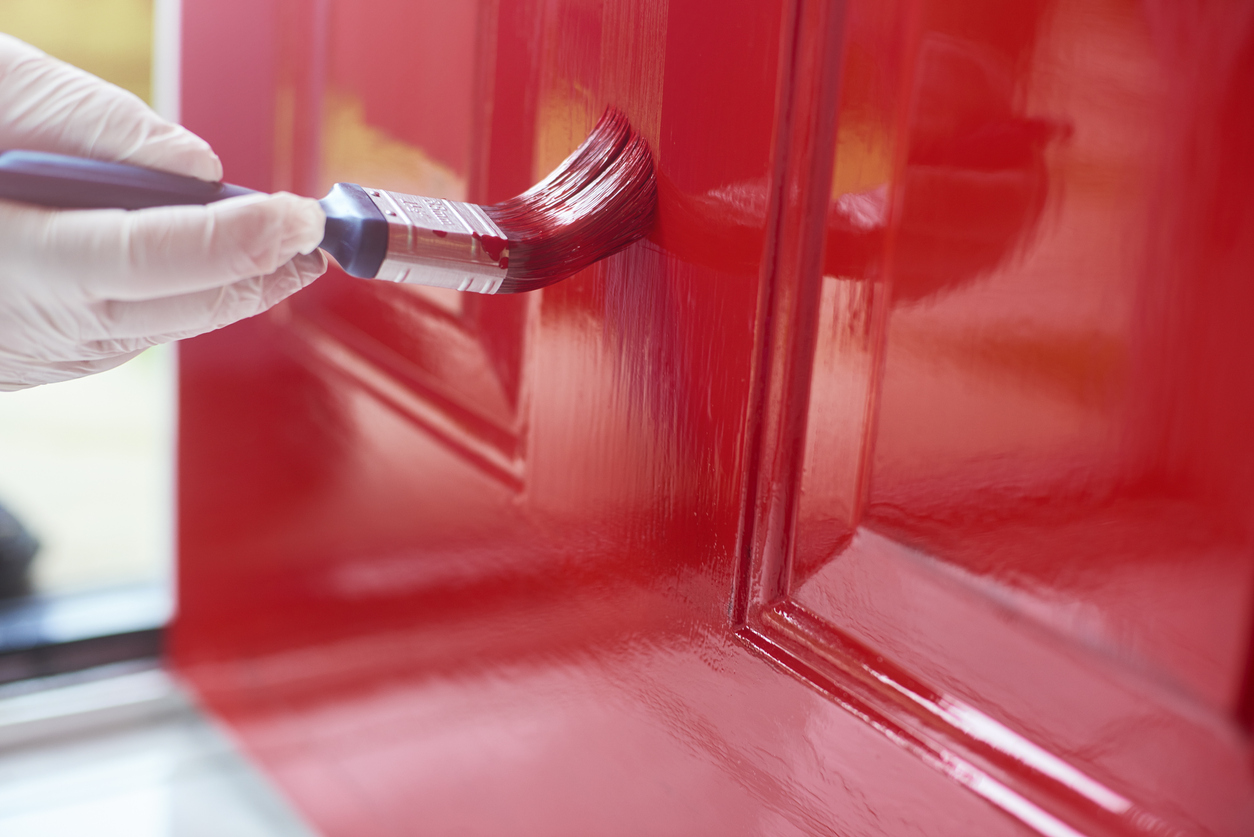
Add a cheerful welcome to your “projects house” with a painted front door. Ideally, you should remove the door from its hinges before painting. Sand, wash, and dry the surface as part of the prep. Remove hardware—doorknob and hinges—and cover any glass panes.
Apply primer or a paint-and-primer-in-one. It will probably take two coats, so let it dry between applications. Once the final coat is dry, replace the hardware and rehang the door.
7. Hang Plants From the Ceiling
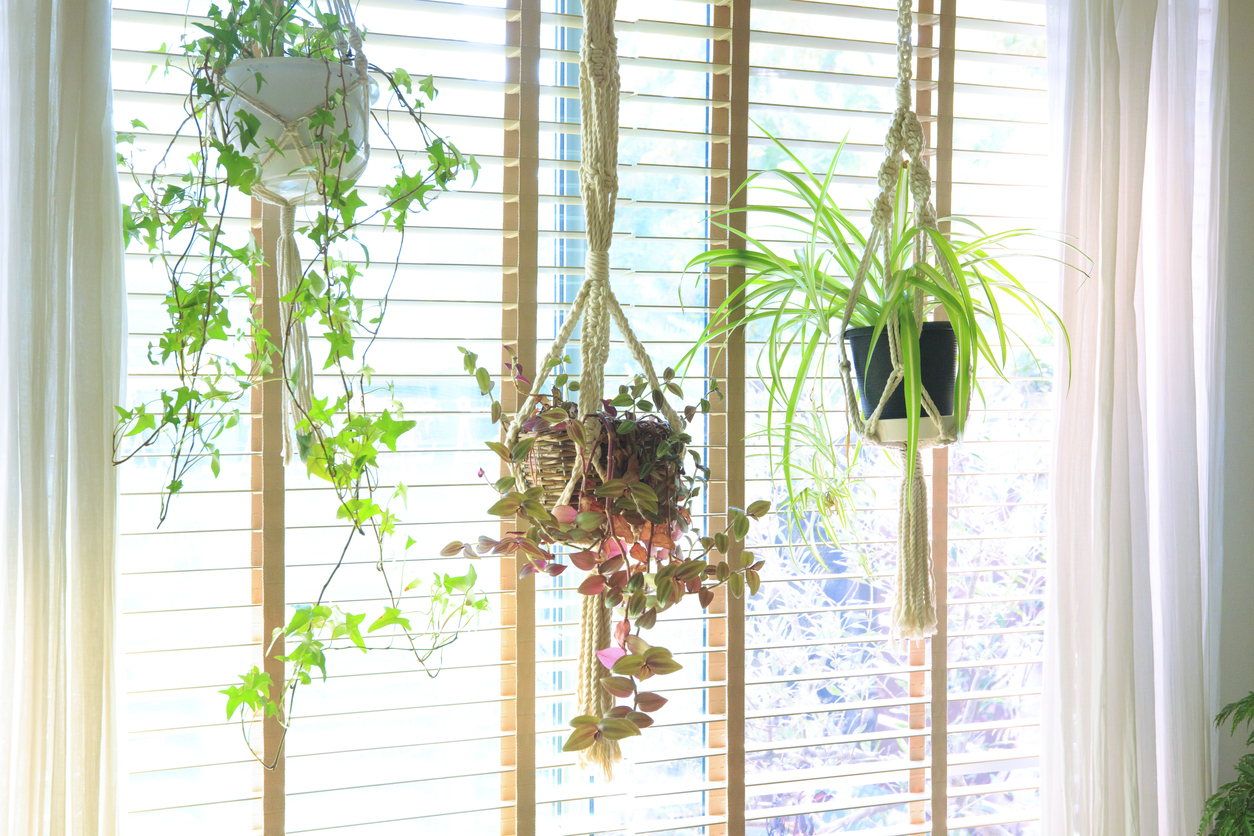
A fun décor DIY project that can improve your health by adding oxygen to a room involves hanging plants from the ceiling. Choose a location that gets the required amount of light for your plant. Locate a stud or beam to attach a swag bolt to, or use a toggle bolt to secure to drywall.
Be sure the bolt capacity is rated for the hanging wet weight of your plant plus its container. Be aware that plastic anchors support less weight from the ceiling than the wall; they are not a good choice for a hanging plant. Once the swag bolt is secure, hang your plant.
8. Reupholster Secondhand Furniture
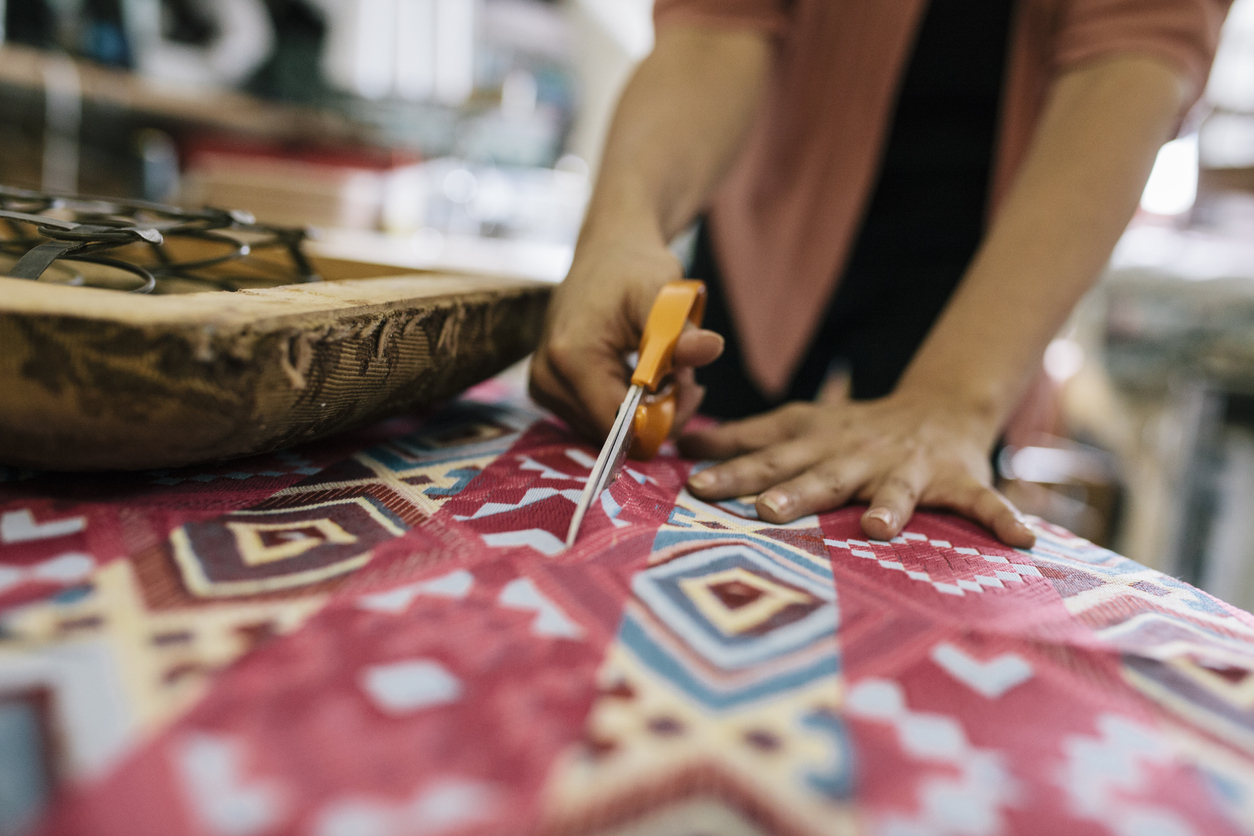
Old furniture often has great “bones” or nice detail, but the upholstery might be worn or simply dated. Reupholstering furniture can give it a second life.
It’s pretty easy to recover a basic chair seat. Measure the cushion to determine the amount of fabric needed; be sure to allow a few inches all around to fold over the bottom of the seat. Remove the seat from the chair. If you need to make any repairs or want to add new padding or refinish the chair, now’s the time to do it.
Cut the fabric to fit. Fold it over the seat and use a staple gun to attach it to the seat’s underside. Stretch it taut and do all sides. Angle the fabric around the corners before stapling. Then reattach to the chair and you have a fresh look.
9. Replace a Faucet

Whether your current faucet has sprung a leak or you’d simply like to update the look to match your décor, you may be able to replace it yourself. If your new faucet has the same hole configuration, this will be a snap. However, even if you want to switch from a three-hole faucet to a one-hole faucet, you can do it by adding an escutcheon plate that covers two of the holes.
Begin by shutting off the water, usually done by turning a knob under the sink. Loosen the nuts on the faucet and lift it out. Then place the new faucet and escutcheon plate if necessary, attach the nuts, and connect the appropriate water lines. If you’re using an escutcheon plate, you may need to caulk it.
RELATED: The Best Kitchen Faucets Tested in 2025
10. Build a Shelf
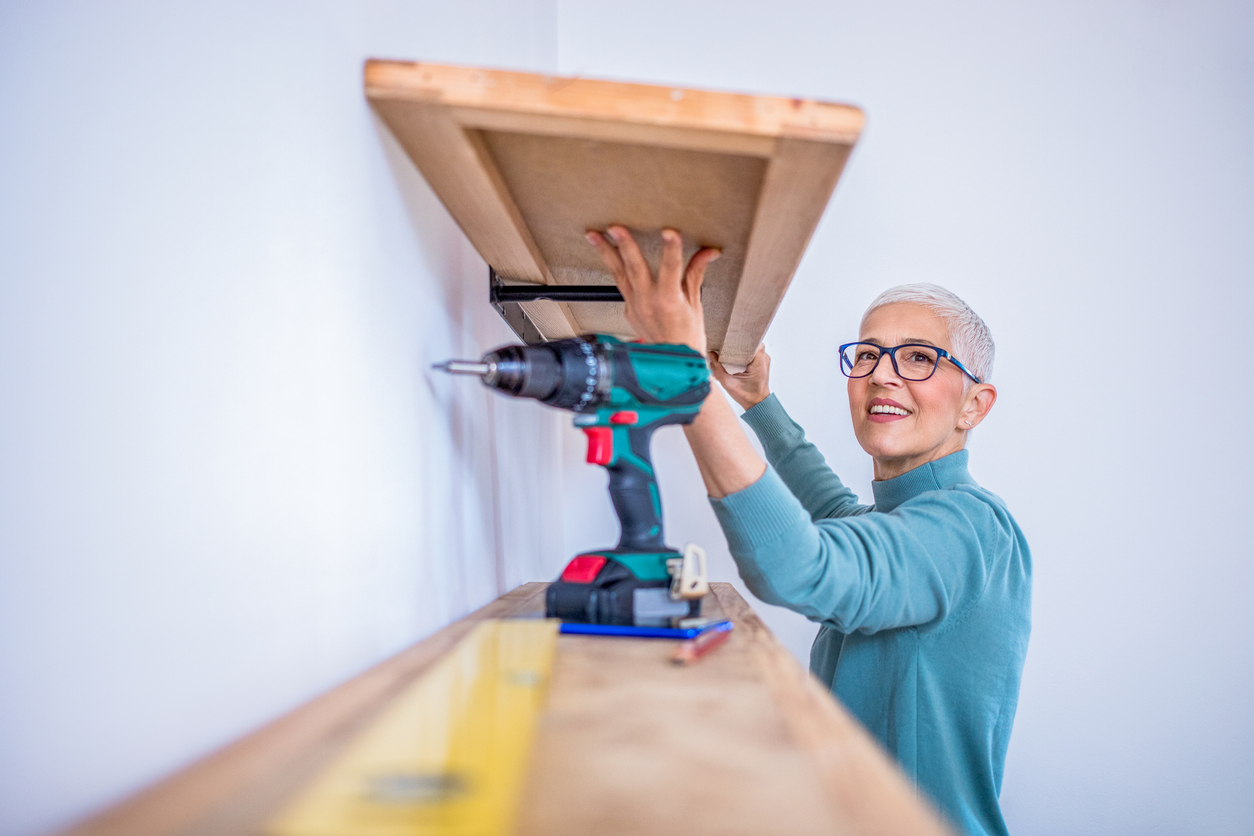
Adding a shelf is a quick and easy project that adds function and form in the way of decorative storage. Determine where you want to hang a shelf and what size the shelf should be.
It’s best if you can attach the supports to a wall stud, but drywall anchors may work if there’s not too much weight placed on the shelf. For longer shelves or heavier loads, you may want to consider adding brackets for extra support.
Measure the height you want and the distance you need between brackets. Drill pilot holes for the screws before screwing the brackets into place. Some shelves simply rest on the brackets; others are attached by screws. Test the strength before placing any breakables on the shelf.
11. Grow Your Own Food
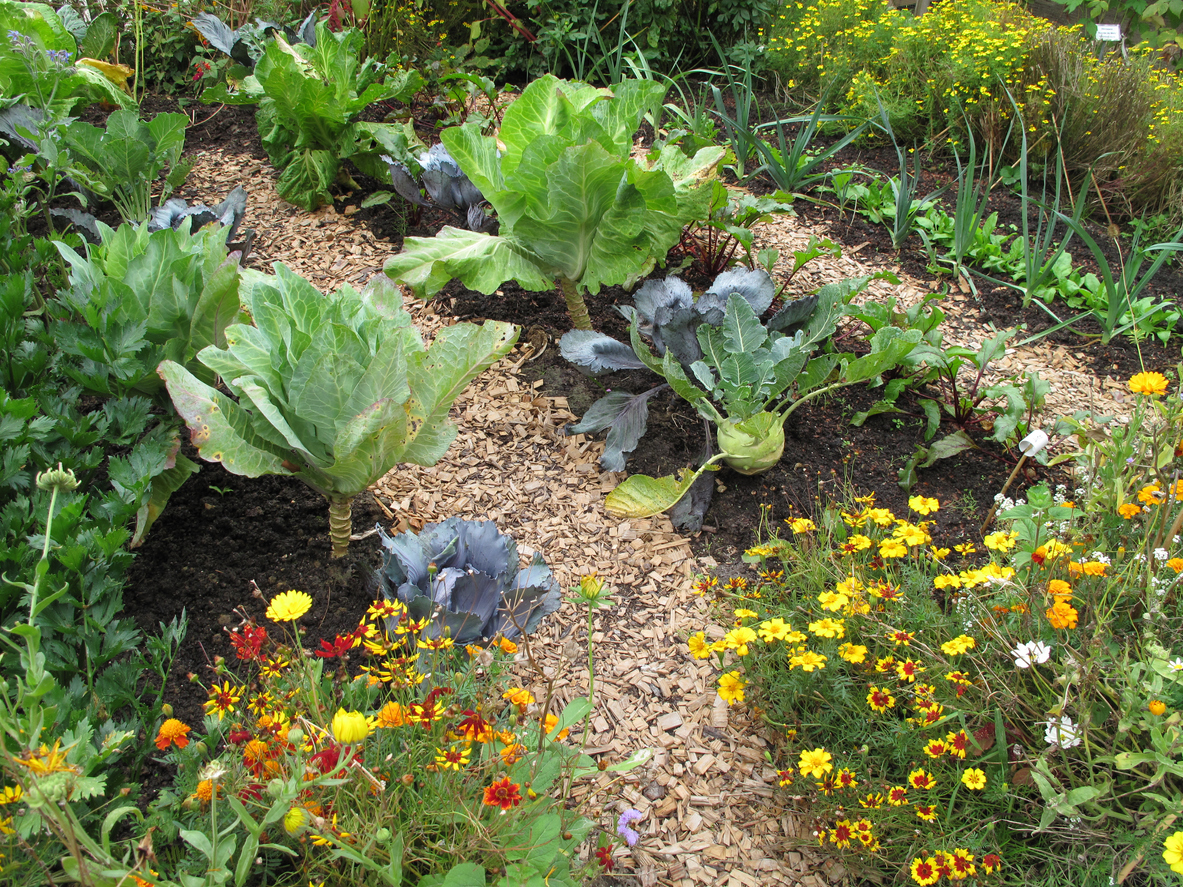
Growing fruits and vegetables provides fresh food at your fingertips. It’s a great learning experience for children and almost always results in tastier produce than you can buy at the store.
Decide how big you want your garden to be, based on what you intend to plant. Choose a spot that gets at least 8 hours of sunlight a day, and remove any sod or other plant material. Prepare the soil by tilling or digging. You may want to add compost or other soil amendments to improve the growing medium.
Plant seeds, seedlings, or a combination thereof, following the planting instructions on the package. Add fertilizer or compost. Water. You may need to provide protection from wildlife or harmful insects, or structure for climbing plants and tomatoes. Periodically, you will probably have to pull weeds and irrigate.
12. Frame a Mirror
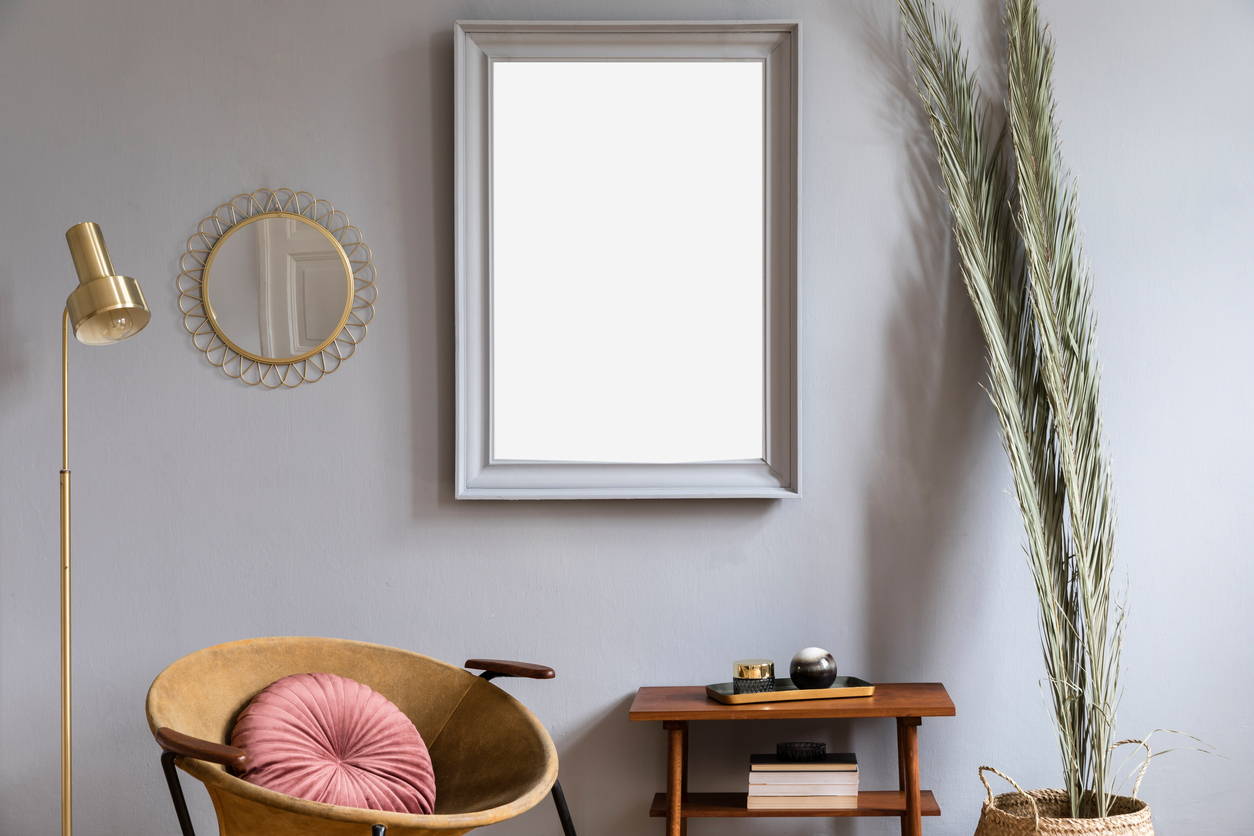
Mirror, mirror, on the wall, who’s the most creative one of all? You can have a luxe mirror for less by making your own frame. Measure the piece of unframed mirror, and purchase an appropriate amount of framing material in a width and style of your choosing. Remember to factor in the mitered corners when determining the lengths you’ll need for each side of the mirror. You’ll need to cut a dado in each piece—a slot for the mirror to slide into. This is most easily done using a table saw, but a router will suffice.
Next, you’ll need to use a miter box to make 45-degree cuts for the corners of the frame. After sanding the wood, insert the mirror and use silicone glue to set the joints. Apply compression with a band clamp while the glue dries. Using a nail gun to insert a nail into each corner is optional. Apply caulk to conceal the joints and wood putty to hide the nails. Affix hanging hardware. Paint or stain the mirror, and hang.
RELATED: How to Hang a Heavy Mirror on the Wall
13. Seal Drafty Windows and Doors
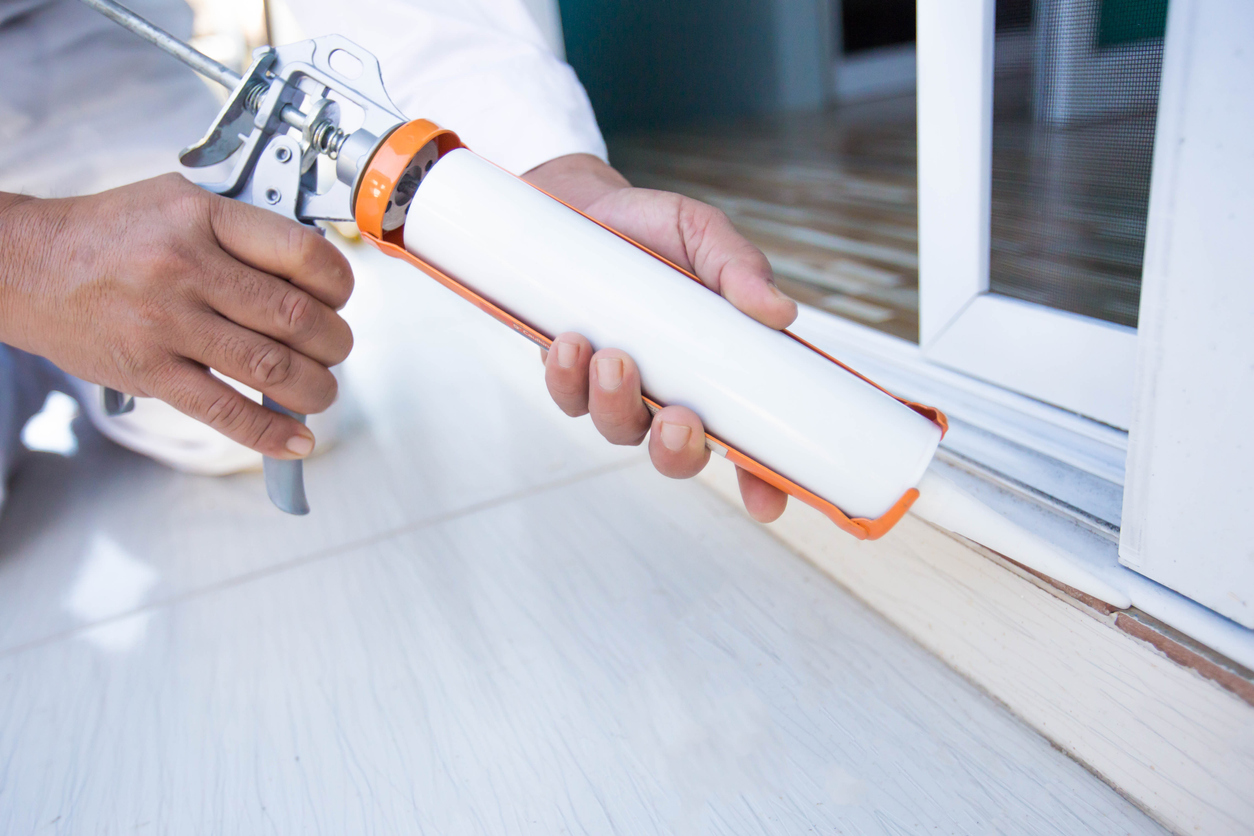
Reduce your heating and air conditioning bills by sealing drafty windows and doors. Latex caulk is often used for this application because it expands more than silicone caulk. Load the tube into a ratchet rod caulk gun.
After you have removed the old caulk and cleaned the area with vinegar, bleach, or liquid caulk remover, let it dry. You may want to tape off the area to avoid getting unwanted caulk on the walls. Once you’re ready, use scissors or a utility knife to cut the tip of the caulk tube at a 45-degree angle. Use the trigger on the caulk gun to apply a thin line of caulk. Run your gloved finger over the line to smooth it. Let dry for 24 hours.
14. Paint Kitchen Cabinets
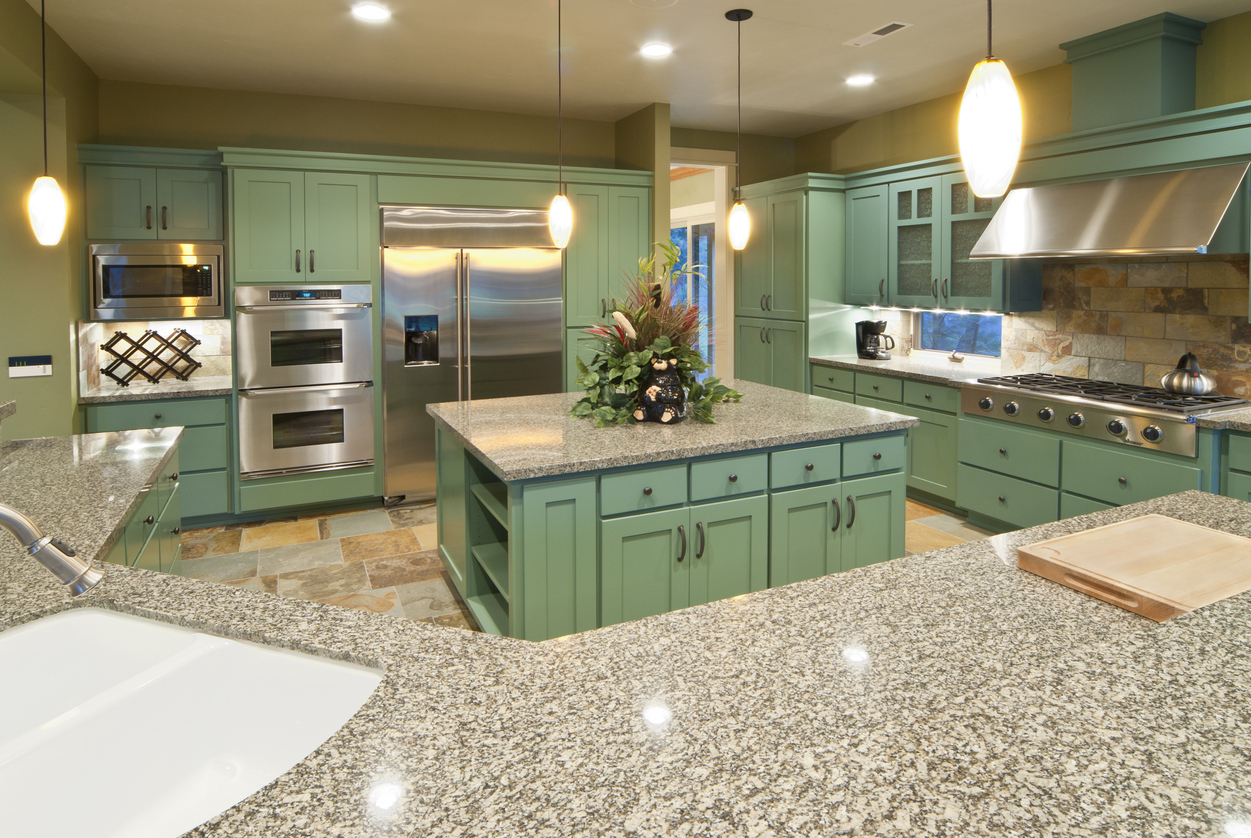
Add some color to your kitchen by painting the cabinets, or lighten up the room by painting them white. Whatever color you choose, select a semi-gloss or gloss paint because it is easier to clean and stands up to wear and tear better than a matte-finish paint.
Remove the doors, drawers, and hardware. Apply two coats of primer. Sand the surface lightly. Apply the paint, going with the grain. Don’t forget to paint the backs of the cabinet doors too. When they’re dry, reinstall and enjoy your new kitchen look.
15. Conceal Cords

Technology has provided a lot of convenience, but it comes with many cords. If you’d rather look at anything but a messy tangle of cords, this DIY for the home project will straighten things out in no time.
There are many options. You can adhere clear Command cord clips, a favorite in our roundup of the best ways to hide every wire in your home, to the back of your electronics or furniture to corral your cords. Some furniture comes with cord-hiding compartments, or you could build your own secret storage into a TV stand. For wall-mounted TVs, you can run the cords through a cord cover like this SimpleCord Cable Concealer Kit. For ultra-invisibility, paint the cord covers the same color as your walls.
Paintable baseboard cord channels, which are covered vinyl tunnels that hardly anyone notices, offer an alternative way to route cords around a room. The D-Line Cord Cover, for example, was a top performer in our researched guide to the best cable management solutions for the home.
16. Illuminate Your Exterior With Solar Lights
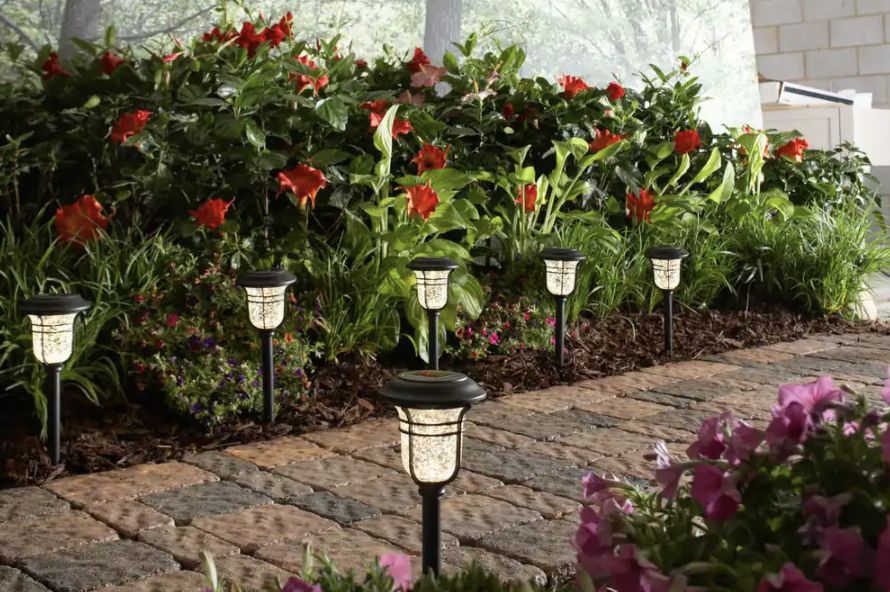
One of the easiest DIY home projects for beginners is adding solar lights to your yard or along a sidewalk or driveway. Available in a wide range of sizes, styles, brightness, and even color of light, solar lights require no wiring and don’t add to your electric bill. What they do add is ambiance and an element of safety.
Stand-alone solar path lights are mounted on a spike that easily slides into the ground. Simply place one every 6 to 8 feet, although you can put them closer for a brighter walkway.
RELATED: The 9 Best Solar Deck Lights, Tested
17. Carve Out a Home Office
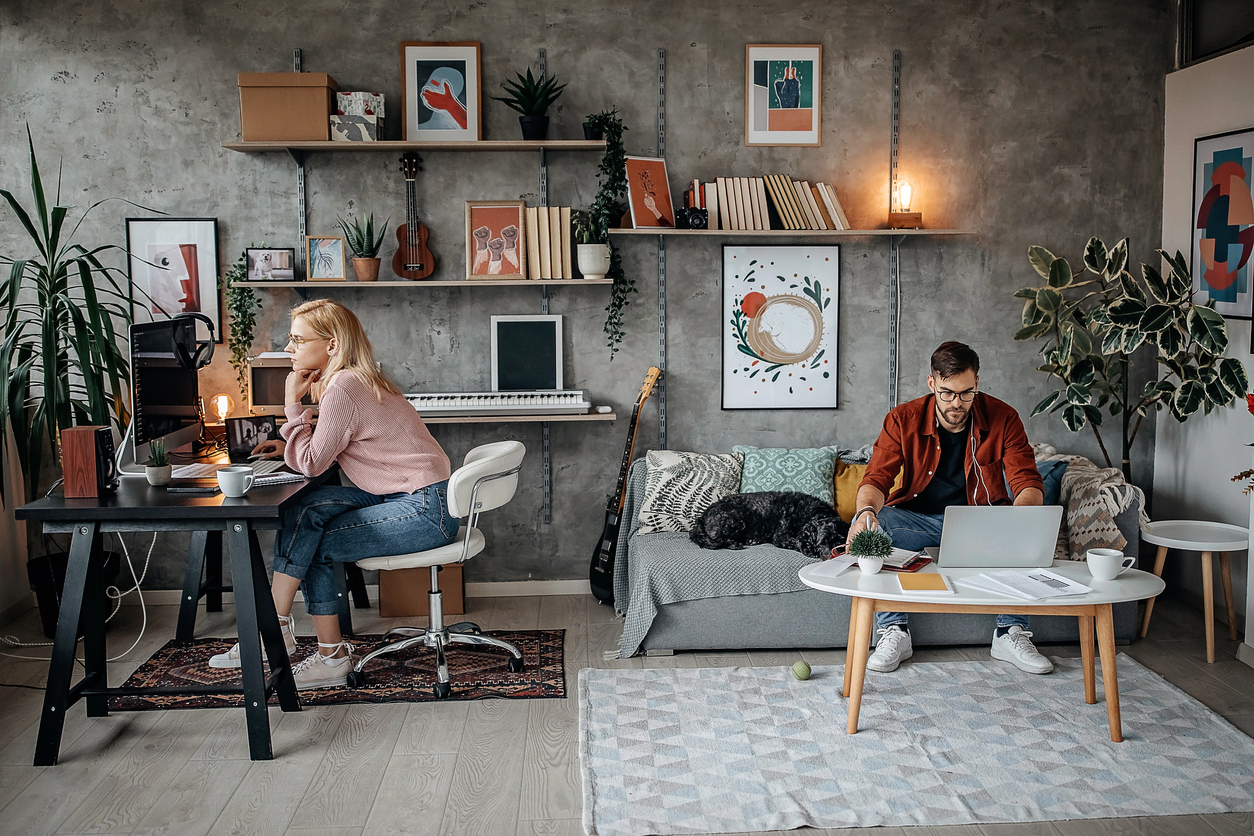
Living through a global pandemic has changed employment status for many of us who now telecommute from home. Whether you’re working full-time from a home office or just need somewhere to pay the bills, you may want to carve out some space where you can take care of business.
Use a nook or a closet if you have to, but if you can commandeer an entire room, consider swapping a hollow core door for a solid door to reduce sound intrusion from the family room. Upholstered furniture, rugs, and quilt wall hangings will also muffle sound from the rest of the house.
You can use a table as a workspace instead of a desk, but be sure to add an ergonomic chair, sufficient lighting, some shelving, and storage. Be mindful of traffic flow so the family doesn’t trip over you.
18. Declutter and Donate

Gain usable space by decluttering your home. Get the whole family involved. First, sort through your stuff to determine what you really use and what you wouldn’t miss. Donate items you no longer need to a school, a homeless center, an animal shelter, your church, or your favorite charity.
Next, store things used infrequently in cabinets and drawers, leaving countertop space free and clear. Use a closet organizer to get shoes, linens, or other closet items in line. For the things you feel must be left within easy reach, try some simple DIY projects to organize your must-haves like shoes, mail, cords, keys, and more.
19. Line Drawers
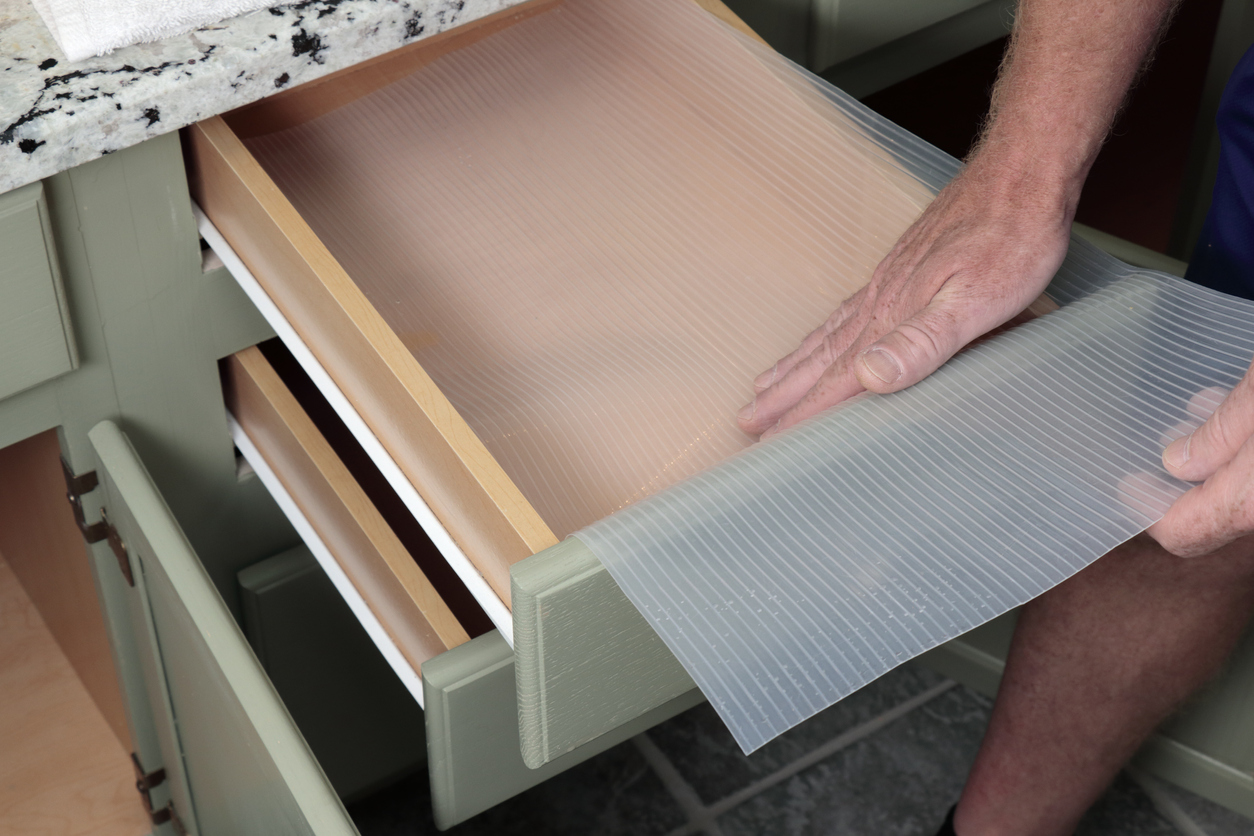
A generation or two ago, housewives lined all their shelves and drawers with adhesive shelf paper. The idea was sound; they protect surfaces from stains and spills, and make clean-up a breeze. But today’s shelf and drawer liners offer choices.
Fabric liners are washable and can be used long-term. Plastic liners work best on open wire shelves, where they prevent items from becoming unevenly balanced or falling through the shelving. Foam liners provide extra cushion for delicate, breakable items. Vinyl liners are the least expensive and are available in the widest array of colors and patterns, but adhesive-backed liners leave a sticky residue when removed.
20. Create a Container Garden
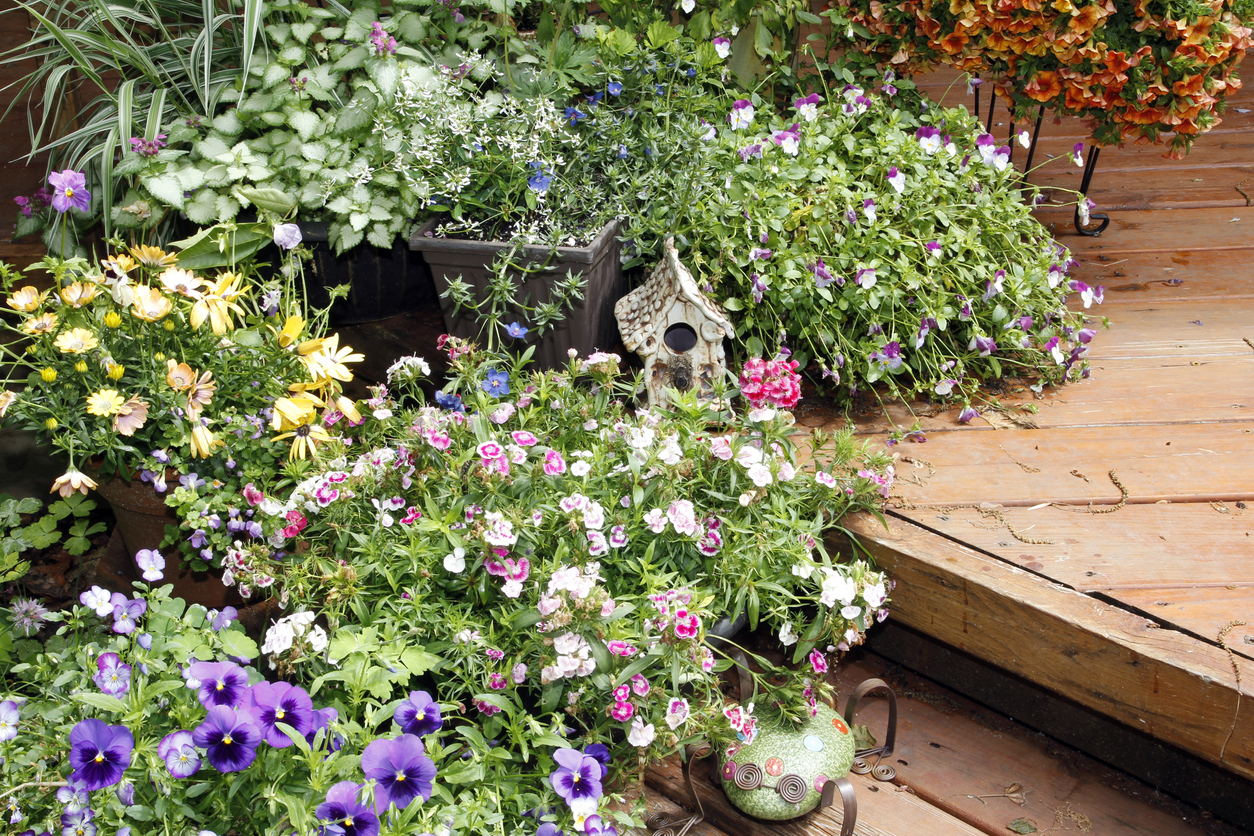
Another great DIY home project for the entire family is creating a container garden. Pretty up your patio with a bouquet of flowering plants in a decorative container. Create bright color combinations that will attract pollinators for an added bonus.
Select an appropriate outdoor container with a drain hole in the bottom and fill it with potting soil. Let the kids choose a selection of plants. The rule of thumb is to combine a thriller, filler, and spiller—a tall, showy plant, smaller plants to fill in the space, and a trailing plant to spill over the side. Take care that all plants have similar sunlight and water requirements and are suitable for your climate.
One kind of container you might want to add to your home are window boxes filled with beautiful flowers.
RELATED: 20 Plants That Are Perfect for Window Boxes
21. Landscape the Mailbox
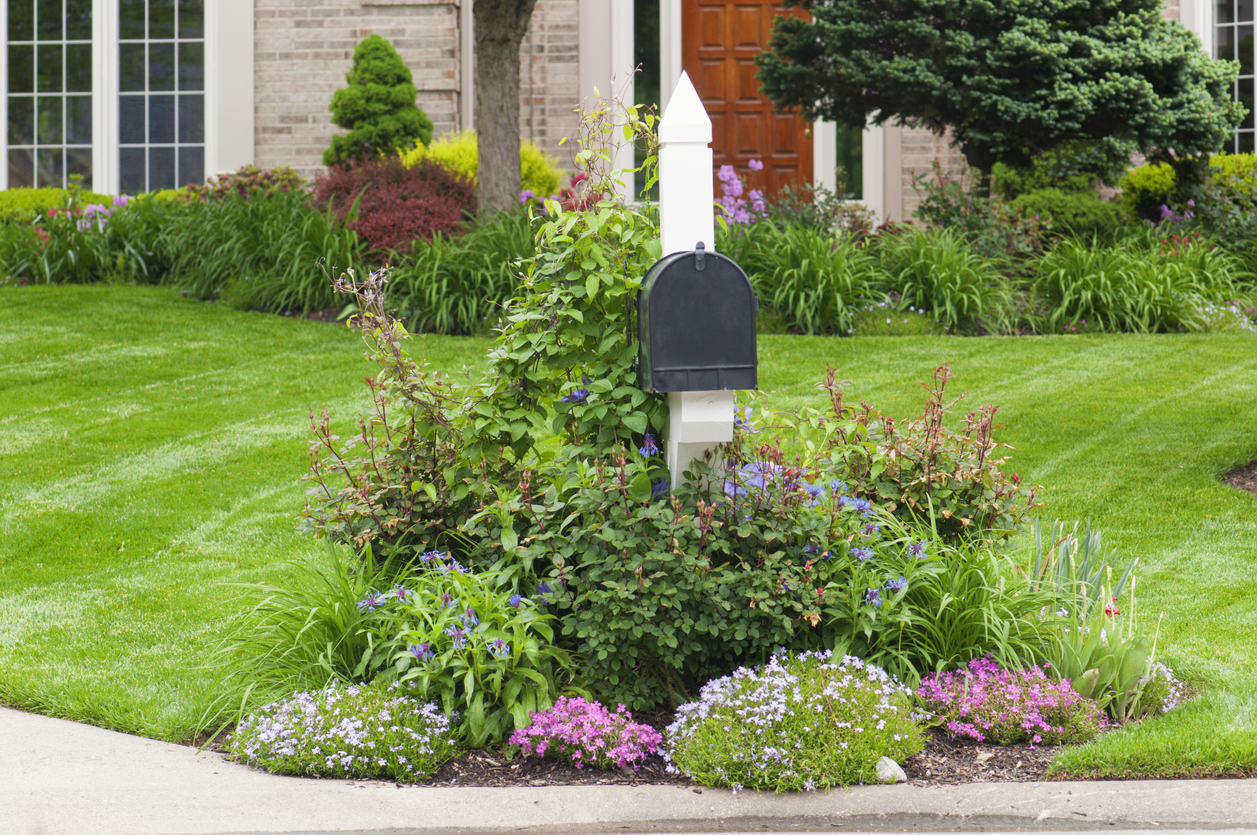
Why not make the mundane tasks a little more fun? Let your personality shine by landscaping the mailbox, which might take some of the pain out of finding bills inside it. For starters, you can repurpose items around your home that are meaningful to you, adding humor, architecture, or historical significance to your daily routine of mail collection. Many of these are easy DIY projects you can do with a few tools.
Other mailbox ideas can involve plantings, mulch, stone, and other more traditional landscape materials that not only make your mailbox more cheerful, but also make it easier to mow around. When planting vines or busy plants, it’s important not to obstruct the mailbox door or flag, which could inhibit you or your postman from accessing the box.
22. Repot Indoor Plants
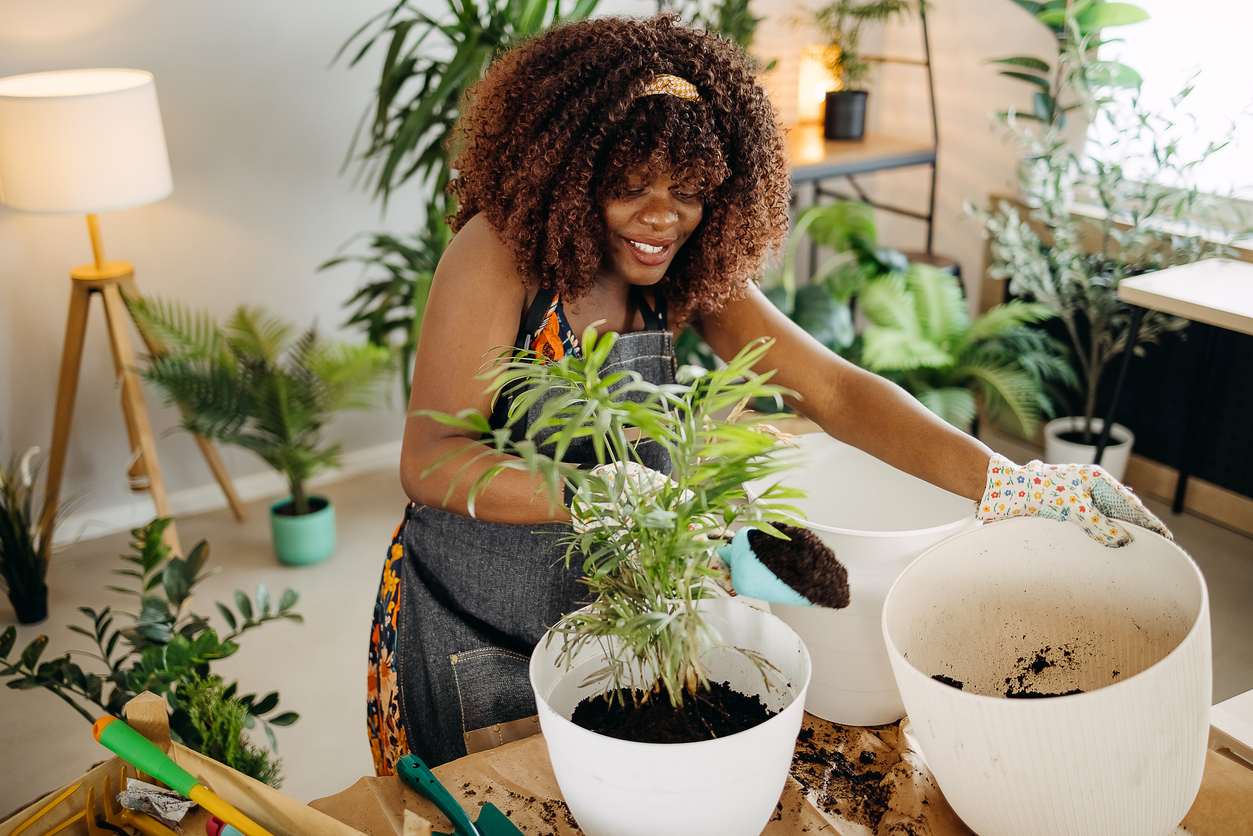
If you’re lucky enough to have a green thumb, your indoor plants will reward you by growing. To keep them happy, you’ll occasionally need to repot them. Let your kids help on this family-friendly project; they probably like getting their hands dirty already.
Signs that your plant is ready for a new home include: roots growing through the drain hole, pot-bound roots, soil that dries out faster than it used to, stunted growth, wilting between waterings, and plant size overpowering pot size.
Simply select another pot—ideally, only one size larger than the current one—and the correct type of potting soil. Carefully remove the plant from its current pot. If it’s rootbound, you may have to tease the roots apart to help it grow. Place in the new pot. Backfill with potting soil as necessary. Water thoroughly. Withhold fertilizer for at least 6 weeks to allow the plant to adjust to its new home.
23. Refinish Old Wood Furniture
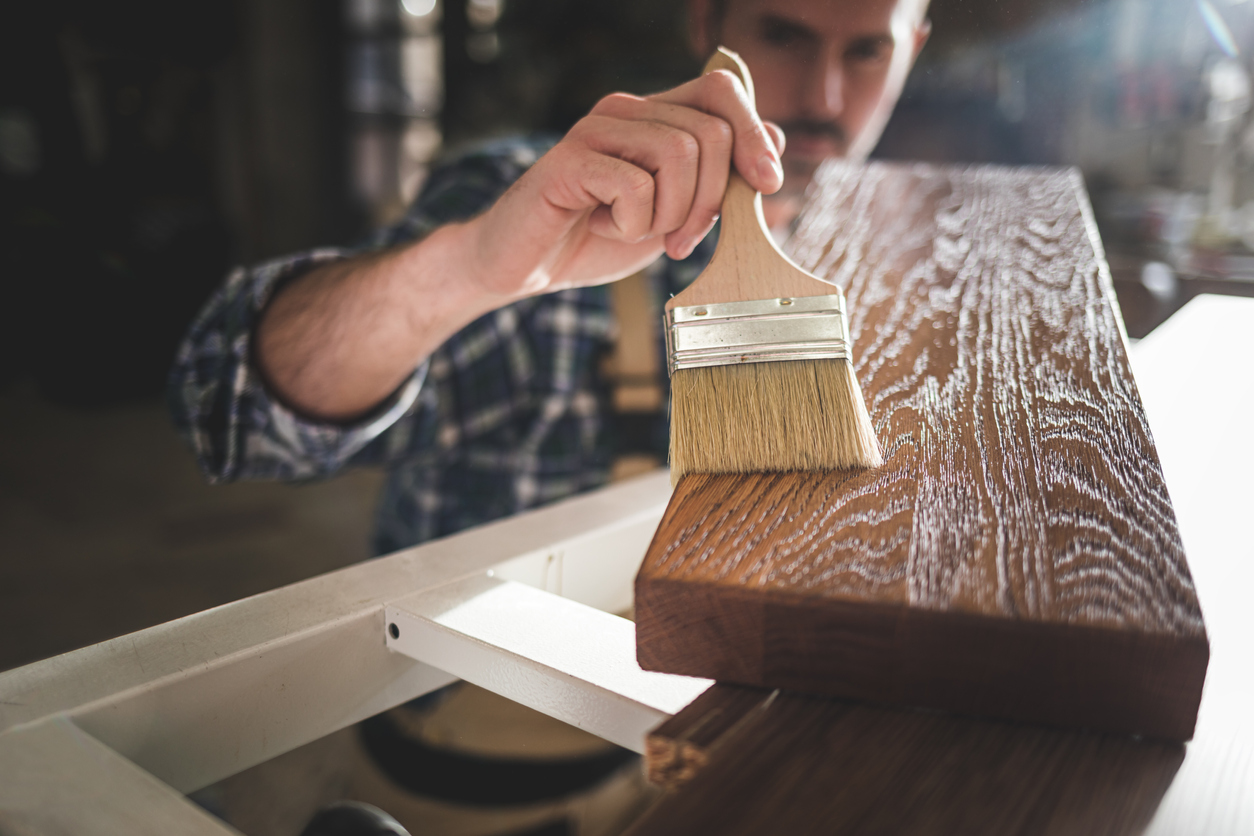
Maybe millennials don’t value “brown wood,” but plenty of other generations do. Whether your wood furniture is a valuable antique or just one of your favorite pieces, it might be worthwhile to refinish it rather than paint it. It’s not as hard as you may think. Nevertheless, this is one of those craft projects that requires some patience and skill.
If you want to refinish wood furniture, remember that preparation is everything. Clean the piece thoroughly. Next, use wood filler to fill any holes. Then, strip the old finish off, following the directions of the project you chose. Use a plastic scraper to remove the solution and the old finish. Lightly sand before applying the new stain. Once that dries, apply a clear-coat finish to protect it.
24. Install a Hanging Pot Rack
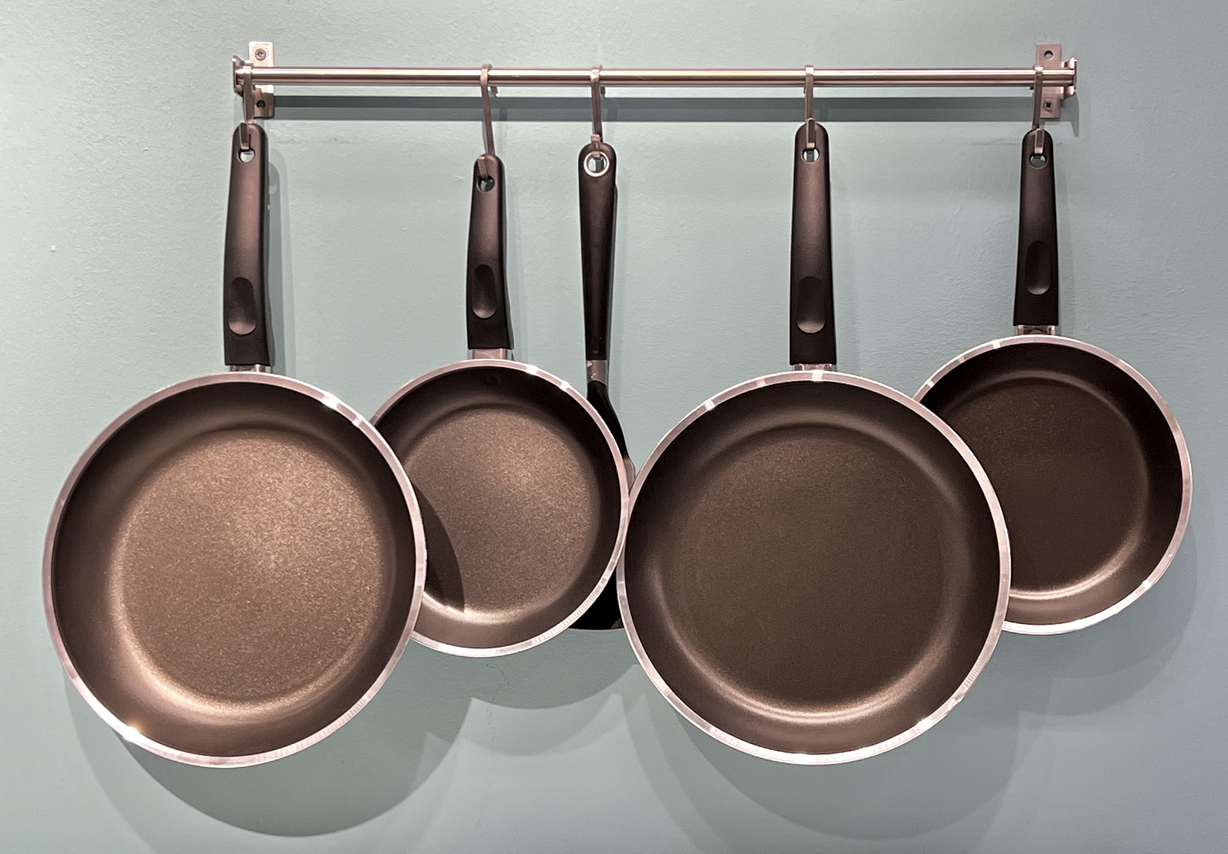
If you like to cook but lack cupboard space to store all the pots you typically use, consider installing a hanging pot rack. First, it’s important to select a pot rack sturdy enough to support all the pots and pans you intend to hang from it. It’s critical to ensure that the hardware attaching the rack to the ceiling is also heavy-duty enough that your pots won’t come crashing down.
Hanging a pot rack in the ceiling is not the best DIY project for beginners, but experienced DIYers will know they first must be sure you drill into the ceiling joists. Use a stud finder to locate them if you’re having difficulty. Measure where the holes need to be by using the rack as a template. From there, things get easier. Attach it and start hanging your pots.
RELATED: 10 Kitchen Updates You Can Do in a Day
25. Paint a Chalkboard Wall

Need a place to write down your weekly grocery shopping list? Or maybe the kids already are scribbling on the walls. A fun DIY home décor project is painting a chalkboard wall.
There are lots of chalkboard paints on the market, including this brush-on special-purpose paint from Krylon, the top pick in our researched guide to the best chalkboard paints. When making your selection, consider the ingredients, ease of application, and drying and curing time. Your choices may depend on how you intend to apply it (paintbrush or spray), how big an area you’re going to paint, and the environmental impact. For example, you might prefer a paint with low VOCs.
Whichever paint you choose, and whatever method you’ll be using, sand and prime the area first for better adhesion and a cleaner finished look. Many chalkboard paints on the market require only one coat. Nevertheless, you might opt to apply two or three for a more durable finish for your chalkboard wall.
26. Reimagine Bookshelves

One way to declutter your home is to add or organize shelving: Everything in its place. Bookshelves don’t have to hold only books and can be much more than merely functional. In fact, you don’t have to put a single book on your bookshelf. You can install sleek, decorative floating shelves to showcase your book collection, photos, pottery, collectables, knick knacks, or whatever looks good on display.
Add a fun, creative bookshelf in any number of shapes and sizes—under-the-stairs triangles, corner units, circular designs, or amorphous shapes.
Even if your bookshelf is rather traditional, you can have fun by rainbow-organizing your books. Get your kids involved to group your books by cover color first. This can create a vibrant display reflecting the spectrum of your reading material.
RELATED: Dos and Don’ts of Arranging a Bookshelf
27. Soundproof a Wall
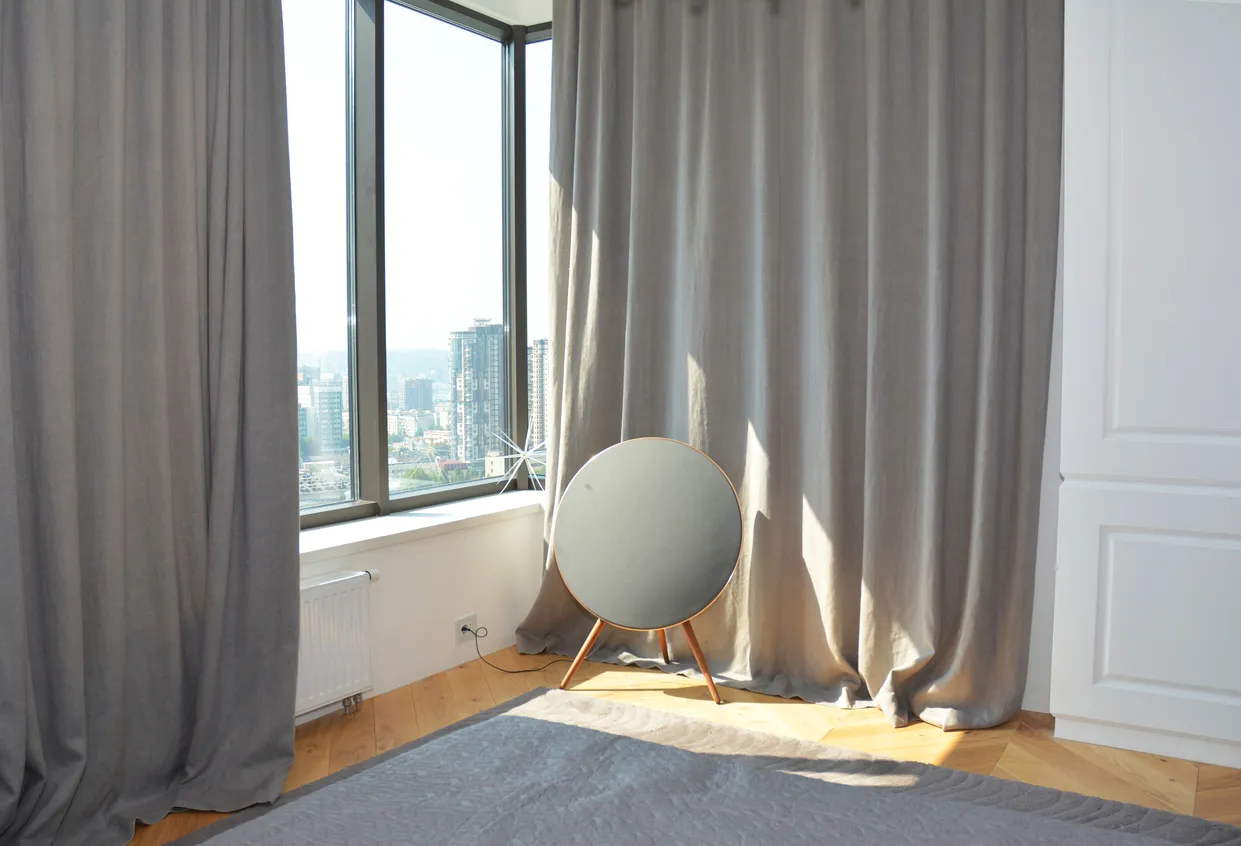
If you work at home, rent your place, or have teenagers, soundproofing a wall may appeal to you but seem like an overwhelming task. Don’t panic; it’s not as invasive as you may think. You won’t be knocking down walls.
A few methods can dampen sound through a wall. For example, hang mass-loaded vinyl, a sound-dampening material used in night clubs, on the walls. Of course, it’s more effective when hung between drywall during construction, but it will still muffle some of the noise. Rolls of MLV are heavy and bulky, so try to find a helper.
If you don’t like the idea of shiny black MLV adorning your walls, try a more decorative option: floor-to-ceiling acoustic—also called blackout or thermal—curtains. As added benefits to their noise-reduction properties, they block light and trap warmth. Pleats act like baffles, enhancing the sound-deadening effects. For enhanced wall soundproofing, do either technique to both rooms that share the wall.
28. Power Wash the Small Stuff
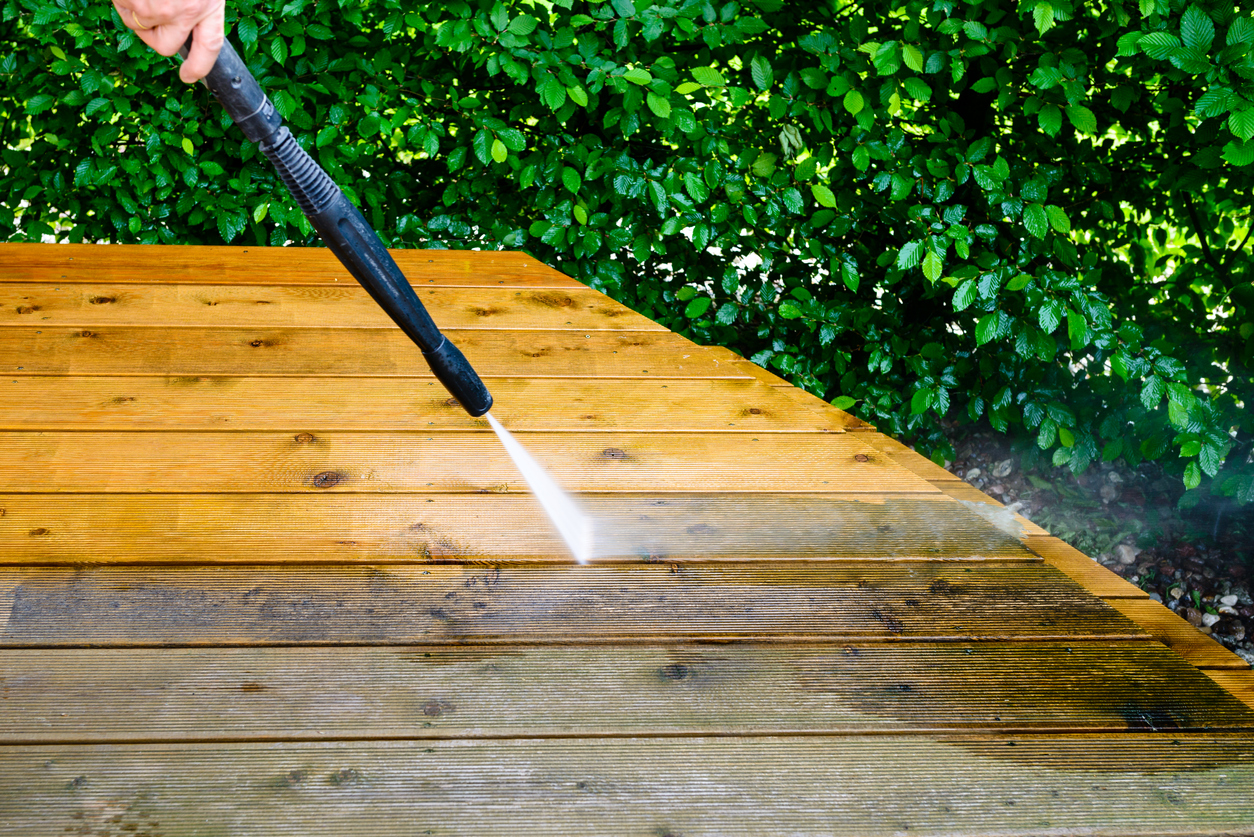
Pressure washing isn’t just for sidewalks and siding. It’s a great way to quickly clean up almost anything. If you’re planning to restain your deck, start by power washing it. Even if you don’t want to stain it, using a pressure washer on it is a great way to get rid of mold, mildew, and ground-in dirt after a summer of outdoor living.
While you’re at it, power-wash the patio furniture before you store it for the winter. Ditto, the lawn mower, bicycles, trailer, and even cars. Just be careful not to blast the paint too hard or it could chip and flake off.
Once your summer annuals have been bitten by frost, power wash the pots they lived in—and your gardening tools, shovels, hoes, and rakes—before storing them for winter. When done with the tools, don’t forget to give your hard-working trash cans a good power cleaning while you’ve got the pressure washer out.
29. Improve Interior Lighting
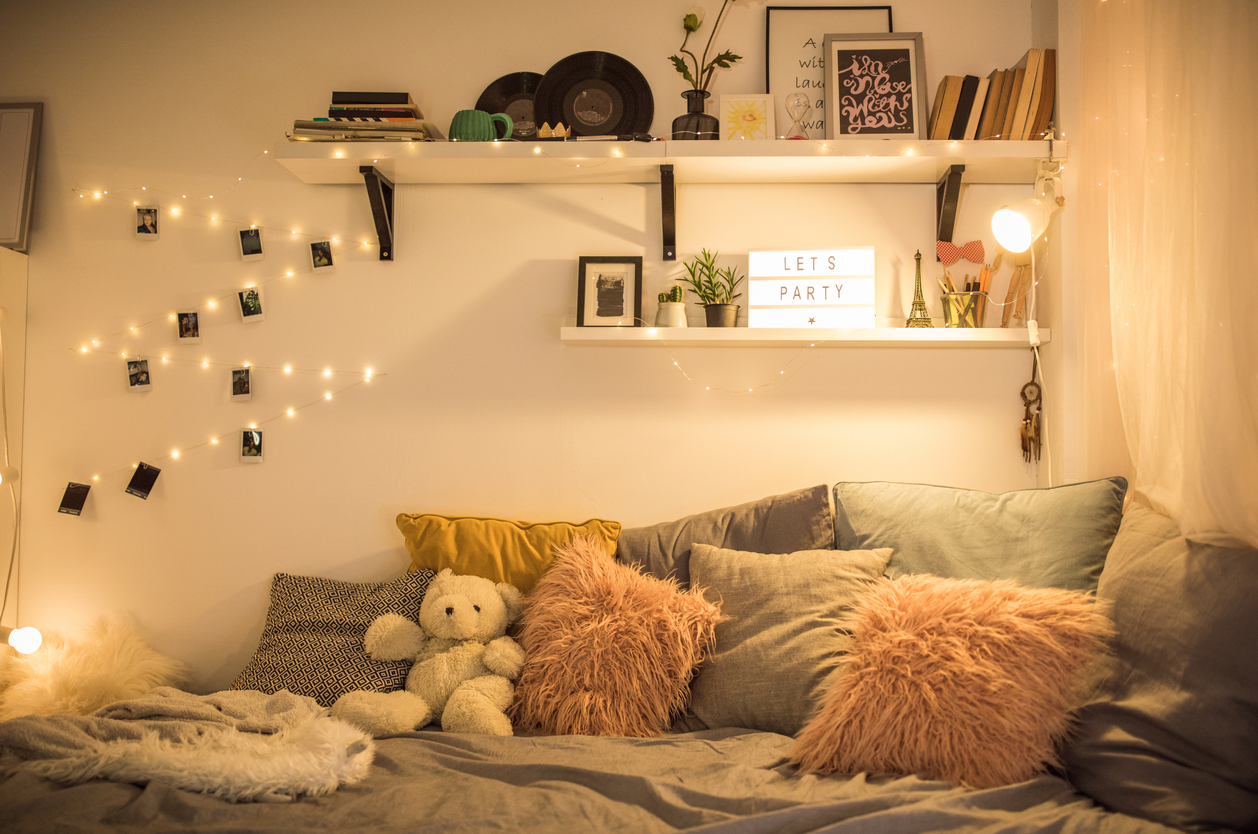
Liven up your interior with creative lighting. The three functions of lighting are task, general, and accent. Undercabinet lighting can Improve safety issues for food prep, enhance ambiance and show off backsplash tile, or even serve as a nightlight for those early morning trips to the kitchen. LED strip lights—aka ribbon lights or LED tape—that can change color ramp up the atmosphere as under-cabinet lighting or as TV backlighting.
Get whimsical with accent lighting by adding statuesque lights in the shape of animals, or convert ordinary items (such as old telephones or teapots) into lights. String lights aren’t just for patios. Draping a few rows of string lights like these indoor/outdoor fairy lights from our researched guide to the best outdoor string lights can set a romantic scene when draped from the ceiling. Or hang a curtain wall of lights. Get twinkle lights for extra sparkle.
30. Step Up Style on the Stairs
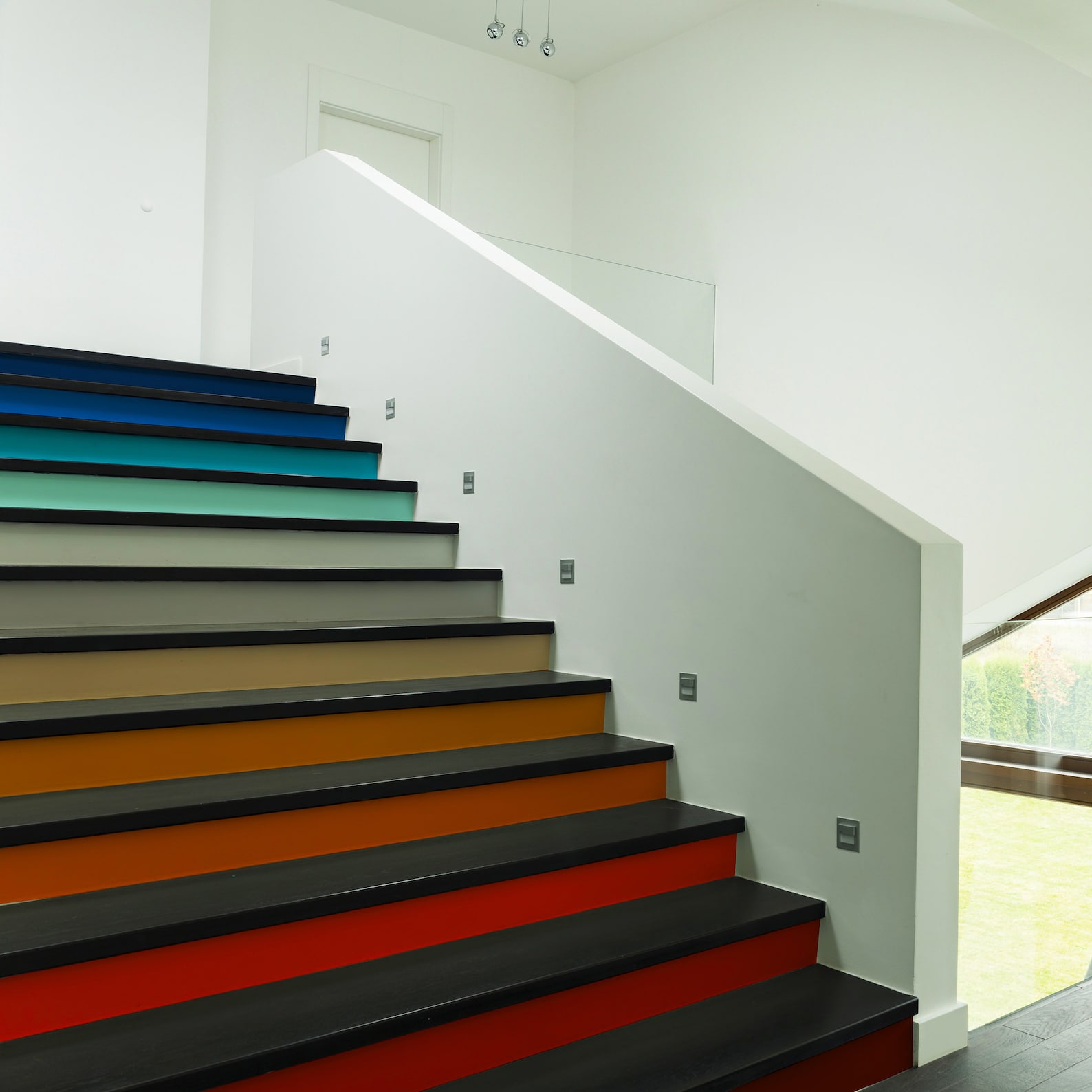
Looking for ideas to add some style to your staircase? There are a number of easy projects you can do to make an impact. Paint the risers and the treads in contrasting colors, or stain the tread and paint the riser.
Apply decorative tile to the risers. Even easier, use trompe l’oeil adhesive stickers to add a bold faux tile look to the risers to turn your stairway or apply stencils to paint patterns on the risers and turn the stairway into more than a mere passageway. You can even use wallpaper to create decorative effects on the risers. Non-slip carpeted stair treads or runner rugs can add a decorative touch and increase safety.
Don’t forget the walls. Paint a mural. Add wall sconces. Make a photo wall or add a picture ledge shelf. Add molding to create wainscoting or paneled walls. Use your imagination to add personality to your stairway to make your home extraordinary.

